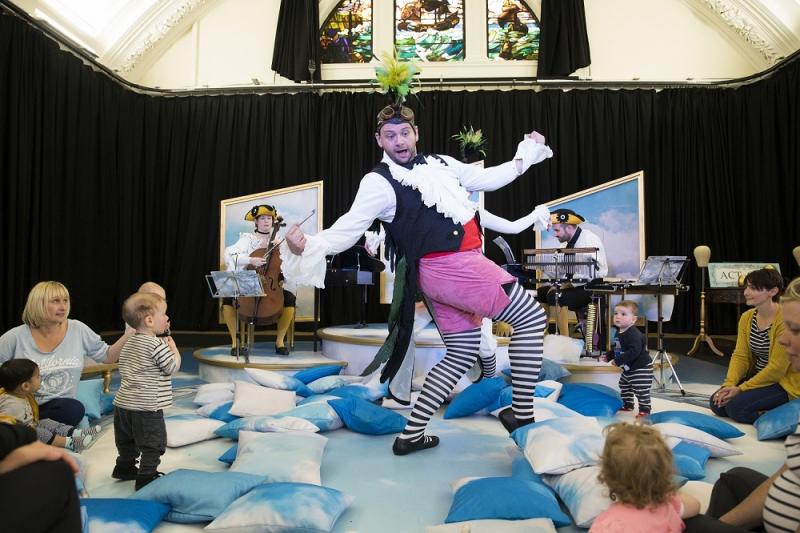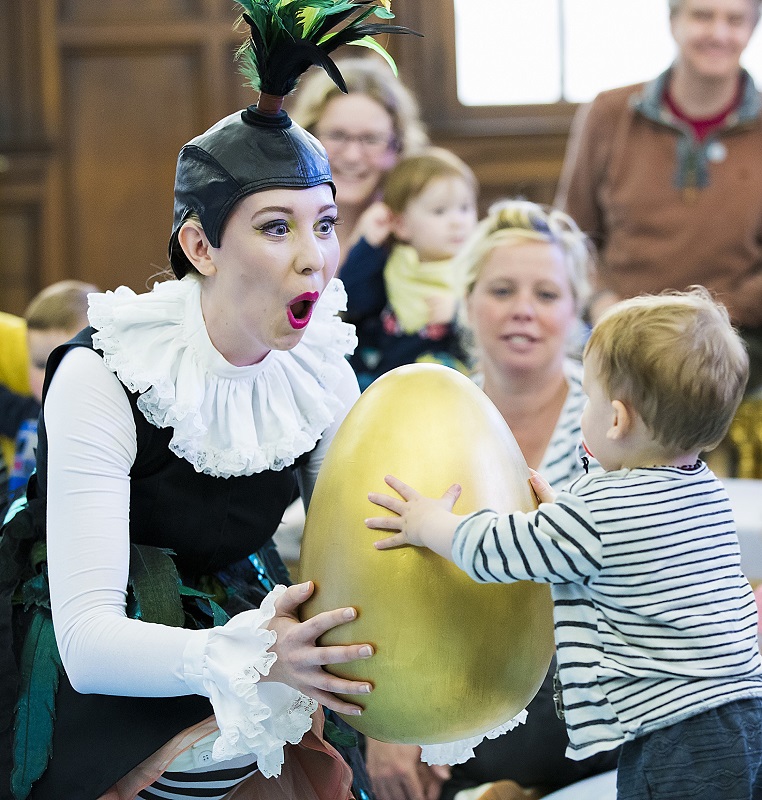BambinO / Last And First Men, Manchester International Festival | reviews, news & interviews
BambinO / Last And First Men, Manchester International Festival
BambinO / Last And First Men, Manchester International Festival
‘Opera for babies’ and a voice from 2,000 million years in the future

The Manchester International Festival – a biennale of new creative work – this year has a new artistic director in John McGrath, and there’s no large-scale new opera or prominent "classical" work, it would seem, other than Raymond Yiu’s song cycle, The World Was Once All Miracle, performed on Tuesday by Roderick Williams with the BBC Philharmonic.
Meanwhile Scottish Opera, its composer-in-residence Lliam Paterson and director Phelim McDermott of theatre company Improbable, have brought BambinO, a new "opera for babies", running at various venues in Greater Manchester throughout the festival.

The piece has a traditional structure, with two acts and an "intermission" of alternative noises, and a story of mummy bird brooding on an egg which turns into another bird and finally flies away to make his own life in the world. It’s sung in Italian, mostly, which works because the words don’t matter – it’s the melodies, and the sounds of classically-trained voices used with mime and costume, that entrance.
The score is full of pastiche, incidentally, which is no criticism as it’s cleverly done and even takes a leaf from Mozart’s book when it comes to bird-like duetting – and the whole feel and presentation are those of 18th century music theatre, which when you think about it was probably the last period, Britten and Messiaen excepted, in which birdsong and art music were considered compatible aural experiences. So full marks to BambinO. Opera can work for babies, and maybe one day they’ll come to enjoy it as adults, too.
Back to Last And First Men. It was a multi-media show, with black and white movie film, pre-recorded narration (by Tilda Swinton), lighting effects (Stuart Bailes) and a music score which is part electronic, part live orchestra – Jóhannsson himself (pictured below by Jonathan Greetarson) performed with it on electronic organ – plus two soprano soloists, Else Torp and Kate Macoboy, all conducted by Daníel Bjarnason.
 The film is haunting: it shows eerie shots of the strange, massive, abstract war memorials Tito had built in his power state Yugoslavia after the Second World War. There are just decaying monuments and empty sky – as if we have stumbled on the last relics of a lost mighty community apparently alien to ourselves. The narration makes it clear: we hear from Olaf Stapledon’s 1930 work of science futurism, Last And First Men, coming to us as a voice from 2,000 million years in the future when mankind has evolved to an 18th and last form and is living on Neptune, his sole refuge in the over-heating Solar System. And even there he knows that he is doomed.
The film is haunting: it shows eerie shots of the strange, massive, abstract war memorials Tito had built in his power state Yugoslavia after the Second World War. There are just decaying monuments and empty sky – as if we have stumbled on the last relics of a lost mighty community apparently alien to ourselves. The narration makes it clear: we hear from Olaf Stapledon’s 1930 work of science futurism, Last And First Men, coming to us as a voice from 2,000 million years in the future when mankind has evolved to an 18th and last form and is living on Neptune, his sole refuge in the over-heating Solar System. And even there he knows that he is doomed.
It was as much a think-piece as a musical one. Indeed, the music score on its own would seem slow-moving and monotonous in the extreme, with multiple doublings of essentially bare textures. The important thing is that it joins with the film, the text, the lighting (and there are times when one or the other takes a rest and the remainder hold attention), to make its point. As Beecham more or less said, it’s not music people love, it’s the noise it makes. This audience loved it, as much as the babies loved BambinO.
rating
Share this article
The future of Arts Journalism
You can stop theartsdesk.com closing!
We urgently need financing to survive. Our fundraising drive has thus far raised £49,000 but we need to reach £100,000 or we will be forced to close. Please contribute here: https://gofund.me/c3f6033d
And if you can forward this information to anyone who might assist, we’d be grateful.

Subscribe to theartsdesk.com
Thank you for continuing to read our work on theartsdesk.com. For unlimited access to every article in its entirety, including our archive of more than 15,000 pieces, we're asking for £5 per month or £40 per year. We feel it's a very good deal, and hope you do too.
To take a subscription now simply click here.
And if you're looking for that extra gift for a friend or family member, why not treat them to a theartsdesk.com gift subscription?

Add comment